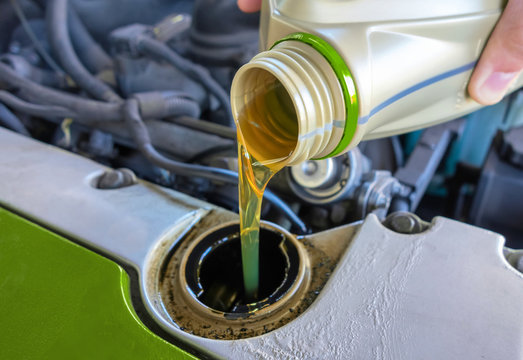If you own a car, you know that regular maintenance is essential. But do you know why it’s so important? In this blog post, we’ll explore why automotive maintenance is so important and why changing your car oil should be at the top of your to-do list. Read on to learn more about why preventive maintenance for your vehicle is critical for its longevity and performance.

The Benefits of Regular Automotive Maintenance
Regular automotive maintenance is essential if you want your car to run smoothly and efficiently. Changing your oil can help keep your engine running at its best, and there are many benefits to doing so. Here are just a few:
- Keeping your engine running smoothly and quietly means less wear and tear on your vehicle. Over time, this can lead to reduced fuel efficiency and greater operating costs.
- If you neglect regular automotive maintenance, you may experience problems with your car’s mechanics, such as poor acceleration or braking, or even decreased performance overall.
- By performing an oil change at the recommended intervals, you’ll also reduce the risk of damaging your engine due to contaminated oil – one common cause of car failures!

How Changing Your Oil Affects Engine Performance
When it comes to your car or truck, you should always make sure to change the oil every 3,000 miles. This will help keep your engine running smoothly and ensure that your vehicle is performing at its best.
There are a few different types of oils that can be used in an engine, and each has its own set of benefits and drawbacks. Understanding which oil is right for your vehicle is important, so be sure to consult your owner’s manual or online resources for more information.
Some signs that you may need to change your oil include: a decrease in fuel efficiency, a rough idle, difficulty starting the engine, or a noise from the engine. By following these simple guidelines, you can ensure that your car is running optimally and that you are taking advantage of all of its potential.
Understanding When to Change the Oil in Your Vehicle
Many car engines use oil to move the piston, and when oil is changed, it helps keep those parts running smoothly. A variety of factors can affect how long your engine will last- including how often you change the oil and what kind of oil you use. So it’s important to know when to schedule an oil change for your vehicle, as well as what needs to be done during an oil change.

Types of Motor Oils and Their Effect on Fuel Efficiency
Different types of motor oils have different effects on fuel efficiency. Many factors, such as the make and model of your vehicle, can affect which oil is best for your car. However, one of the most important factors is the type of engine your car has.
Some engines use synthetic oil, while others use regular oil. Synthetic oil is made from synthetic materials, and it has a different composition than regular oil. Synthetic oil is designed to resist wear and tear on your engine, and it can help improve fuel efficiency.
Regular oil is made from crude oil, and it has a different composition than synthetic oil. Regular oil is designed to protect your engine from wear and tear. It can also help improve fuel efficiency.

Recognizing Signs That Indicate You Are Due for an Oil Change
Understanding When Your Oil Needs to Be Changed
It’s important to keep your car running smoothly by regularly changing its oil. The type of oil your car uses can affect its fuel efficiency, so it’s important to choose the right one for your vehicle.
There are three types of motor oils: synthetic, semi-synthetic, and mineral. Synthetic oils are made from synthetic materials and are the most common type. Semi-synthetic oils are made from a combination of synthetic and petroleum oil. Mineral oils are made from natural sources, such as crude oil or coal tar.
Each type of oil has its own benefits and drawbacks. Synthetic oils are the most fuel efficient, but they can be harder to clean and may cause more wear and tear on your car’s engine. Semi-synthetic oils are a good middle ground; they’re more fuel efficient than mineral oils but easier to clean and don’t cause as much wear and tear on your car’s engine.
To check if you need to change your oil, look for these signs: your car is using more oil than it did before, there are black marks or stains on the engine or gearbox housing, your car smells like gear oil, or the motor noise has increased. And when it’s time for an oil change, here’s what you should do:
-
Clean all visible parts of the engine with a degreaser before changing the oil. This will remove any dirt, grime, and contaminants that could gum up the engine.
-
Wear gloves and a face shield to protect your skin from harmful fumes.
-
Wait until the engine has stopped running before unscrewing the oil pan. Use a clean container to catch all of the oil that comes out.
-
Replace the oil pan gasket if it’s missing or if it’s damaged. Be sure to replace any other items that came with your car, such as O-rings, prior to reinstalling the oil pan.
Identifying the Signs of a Needed Oil Change
One of the most important maintenance procedures you can perform on your car is oil change. Changing your engine’s oil will keep it running smoothly and protect its internals; this is especially true over time as the engine becomes more putrged with dirt and other debris.
There are a few things you can look out for to determine when it’s time for an oil change:
- A “check Engine” light may come on, warning you that your car’s engine has low levels of air or fuel economy and needs an intervention. This usually means a new filter has been installed (and the old one should be replaced at least once every 7,500 miles) or that there’s something blocking the engine’s air intake (such as a pipe).
- The car may start to smoke during operation; this is usually an indication that the engine is running too hot.
- The oil level should be checked every 3,000 miles and the filter replaced at least every 7,500 miles.
Benefits of Regularly Scheduled Oil Changes
Regularly scheduled oil changes can help your car run better and last longer. Here are some benefits of regularly scheduled oil changes:
- Your car will work more efficiently because it will not wear down as quickly from friction due to the lack of lubrication.
- Oil protects metal surfaces from corrosion, making your car last longer.
- Oil keeps metal moving smoothly and reduces noise levels when brakes or gears are being operated.
Establishing a Reoccurring Maintenance Schedule
If you have a car, it is important to keep it in good working order. This includes regularly scheduled oil changes. Here are some reasons why:
-
Your car’s engine runs smoother when the oil is in good condition.
-
The engine will last longer when it is properly lubricated.
-
You will save money on repairs if you keep your car’s engine running smoothly.
-
You will avoid dangerous situations if you know your car’s engine is well-lubricated.

Find Out What Parts Need to be Replaced During an Oil Change
Oil changes are required on a periodic basis to keep your vehicle running smoothly. When it comes to choosing the right type and brand of oil for your car or truck, there is a lot of information out there. However, knowing when you need to change your oil and what steps need to be taken in order to do so yourself are essential for ensuring that your engine remains performing at its best. In this section, we will discuss how changing your oil affects engine performance and when you should take action. We will also provide tips on how to choose the right brand and type of oil for your car or truck based on its make, model and driving habits.

Learn About Different Methods for Performing an Oil Change at Home
There are a few different ways to measure how often your car needs an oil change, but the most common way is to track the number of miles you drive each month. This doesn’t always give an accurate indication of when it’s time for an oil change, as your car’s engine may not require an oil change until it reaches a certain mileage threshold. In addition, your car may need more frequent oil changes if it’s driven in cold weather or if it has a lot of hills.
Regardless of how often you think your car needs an oil change, it’s always important to have it serviced by a professional mechanic. A professional will be able to identify any issues with your engine and recommend the best way to fix them. If you choose to do your own oil change, be sure to read the instructions carefully and use the correct type of oil for your car.

Regardless of Miles, Keeping Track Of Time Between Services Matters Most
Keeping Track of Time Between Services: The Most Important Factor
Regardless of how many miles your vehicle has on it, regular maintenance is crucial to keeping your car running smoothly. Automotive service intervals are typically measured in thousands of miles and can be determined by the manufacturer or a dealership. However, regardless of the timeframe between services, one key factor that always matters is timekeeping. Here are five things you should keep an eye on when it comes to keeping your car in top condition:
- Check fluid levels – Anytime fluid levels get low, your engine can start performing poorly. Verify all fluids are at their proper levels and empty any that may be contaminated or past their expiration dates.
- Check brakes and tires regularly – Brakes and tires require regular inspection for signs of wear or degradation. If either of these components starts to lax, your car will start to skid and feel squirrely.
- Check headlights – Headlights should be checked for proper alignment, clear coatings, and efficient light output. Any irregularities can lead to decreased visibility on the road in low-light conditions.
- Check engine oil levels – Car engines run much smoother when they are properly lubricated with synthetic oil. Checking engine oil levels is one way to ensure your vehicle is receiving the right amount of lubrication.
- Check fluids and mechanic records – As a general rule, it’s always a good idea to have a reliable mechanic inspect your car and document any repairs or Maintenance Schedules performed on it in order to keep track of when your car should be serviced.
Why You Should Change Your Car Oil Even If You Don’t Drive Much
Regardless of how little you drive your car, it’s important to remember to change your engine oil regularly – particularly if you use synthetic oil. Synthetic oils can work well in a wide range of engines, but over time they can build up deposits that can cause damage. Over time, these deposits can clog up crankcase ventilation systems and eventually lead to engine failure. And even if you don’t use synthetic oil, changing your engine oil is still a good idea because the other oils in your motor could wear out and become damaged over time. In fact, most automakers now require their customers to change their engine oil every 5,000 miles or every 3 months (whichever comes first), regardless of the type of oil used.
Understanding How Often You Should Change Your Oil
Regardless of how often you drive, it’s always important to keep your car oil in good condition. Not only will doing so prevent your engine from seizing up, but it will also prolong the life of your transmission and other parts. Here are five reasons why you should change your car oil regularly:
-
You can prevent a seizure from happening. When your engine starts to seize, air bubbles build up in the oil causing it to heat up and become violent. A seized engine is almost impossible to start, which is why it’s important to have regular maintenance done on it no matter what age or make of vehicle you’re driving. By keeping an eye on the condition of your car’s oil, you can avoid this from happening in the first place.
-
Your car’s transmission will last longer. The gears in your car’s transmission are held together with a metal mesh, and over time this mesh can become brittle and start to break. When this happens, it causes transmitters to slip and makes it difficult for them to keep up with the speeds at which you’re driving. Regularly changing your car’s oil will help to keep the gears properly lubricated, thus extending the life of your transmission overall.
-
A good seal between parts prevents corrosion from happening. Corrosion is a process by which metals turn into compounds that can cause damage or even destruction to other parts of your vehicle. In order to prevent corrosion from taking hold, all mechanical components on a car need a good seal between them. This includes the oil in your car’s engine, which is why it’s important to change it regularly.
-
It keeps your car running smoothly. When you have a good seal between all of the parts of your car, you’re less likely to experience problems with them. This includes things like hesitation or jerking when you’re driving, which can be caused by a lack of lubrication. By regularly changing your car’s oil, you can keep your vehicle running smoothly and prevent any major issues from arising.
-
It’s a safety precaution. If you ever have to take your car to a mechanic, they’ll be able to tell you how often your car needs to be serviced based on the condition of its oil. By regularly changing your car’s oil, you’re taking a precautionary step that will keep you and your passengers safe.
Doing It Yourself? Here’s How To Choose The Right Car Oil For Your Car Or Truck
For many drivers, the automotive maintenance process is an important part of keeping their car running smoothly. Regular oil changes can help prevent costly mechanical problems down the road and can also improve fuel efficiency. Here are some of the benefits of regular automotive maintenance:
- Regular oil changes can protect your car’s engine from wear and tear and tune it to run more efficiently.
- Oil changes can free up clogged engines, leading to increased acceleration and gas mileage.
- In addition, by regularly changing your motor oil while you have your vehicle serviced at a dealership or mechanic, you’re ensuring that all moving parts in your engine are working as they should be. Clogged bearings or pistons will adversely affect performance and may even require replacement altogether.
- By properly maintaining your car’s fluids, including its motor oil, you’ll keep it running cooler which will extend its life significantly.
Prolonging the Life Of Your Car Through Regular Automotive Maintenance
Regular automotive maintenance is one of the most crucial steps you can take to keep your car running well. Not only does it ensure that your vehicle is mechanically sound, but it can also improve fuel efficiency and prolong the life of your car. In order to equip yourself with the knowledge necessary to maintain your own car, read on for our top 10 tips on how to do it correctly.
It is essential to properly maintain your automotive in order to ensure it runs at its optimal performance level. Regular oil changes are necessary for preserving engine performance and fuel efficiency, as well as prolonging the lifespan of your vehicle. Knowing when to change the oil and which type of motor oil is best suited for your car or truck are important, but tracking miles driven between services can often be just as effective a measure for scheduling regular maintenance. Ultimately, if you stay on top of preventive maintenance measures like changing the oil in your vehicle regularly, you can save yourself from major issues down the line.

